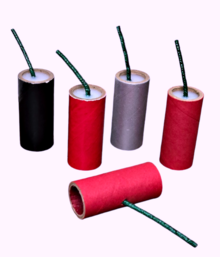M-100 (explosive)
M-100s are a class of powerful firecrackers commonly called salutes.

Description
[edit]M-100's consist of a cardboard tube 2-1/8" x 3/4". Colors may vary. They contain 10 grams of flash powder that is ignited via a visco fuse positioned in the center or side of the tube.[1] In some cases, they are maxed out at 15 grams which is the physical limit for 2" x 3/4". These are the most common flash salutes you will see on the streets in and around the 4th of July. They are much more powerful than an M-80 which only contains 3 to 5 grams.
In the United States, M-100s are illegal to manufacture, possess, and sell without a proper license, and are regulated by the Bureau of Alcohol, Tobacco, Firearms, and Explosives (ATF).[1] M-100s were first banned by the Child Protection Act of 1966.[2]
Accidents
[edit]In 1983, an explosion at a secret unlicensed fireworks factory manufacturing M-80 and M-100 fireworks near Benton, Tennessee, killed eleven, injured one, and inflicted damage within a radius of several miles.[3] The operation was by far the largest-known illegal fireworks operation in US history, and the initial blast was heard as far away as 20 miles (32 km) from the site.[3]
See also
[edit]References
[edit]- ^ a b "Fact Sheet - Illegal Explosive Devices". atf.gov. Bureau of Alcohol, Tobacco, Firearms and Explosives. May 2019. Retrieved 2020-09-10.
- ^ "Banned Illegal Explosives". americanpyro.com. American Pyrotechnics Association. Retrieved 2020-09-10.
- ^ a b "Fireworks suspect charged with deaths". news.google.com. The Spokesman-Review. May 30, 1983. Retrieved April 19, 2013.
